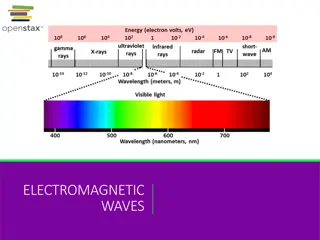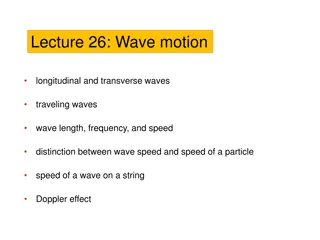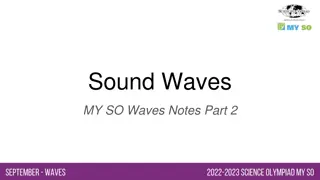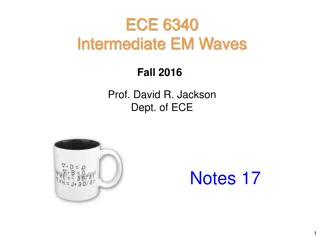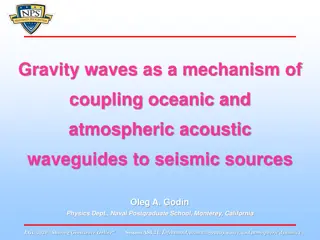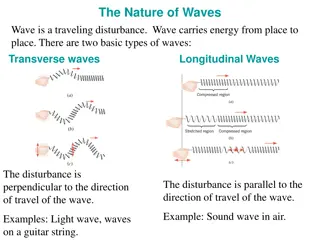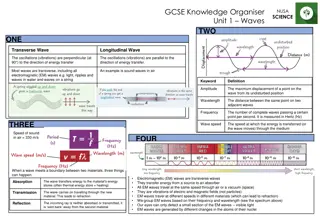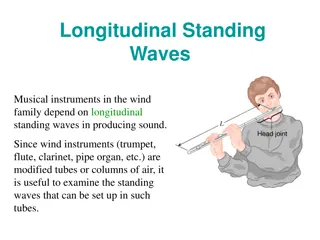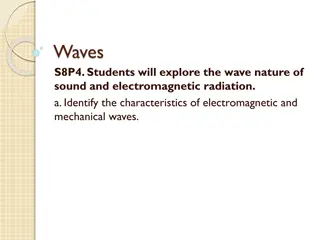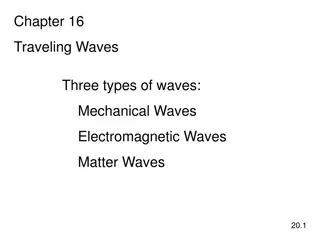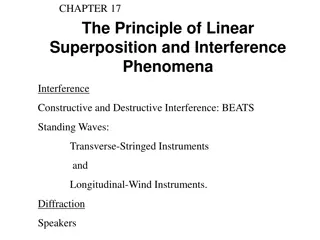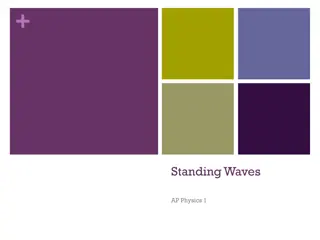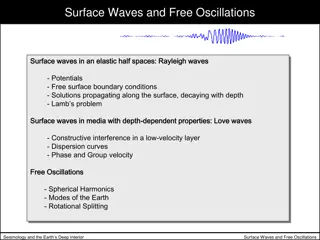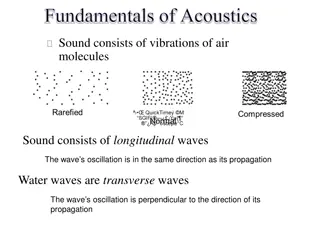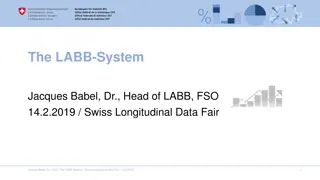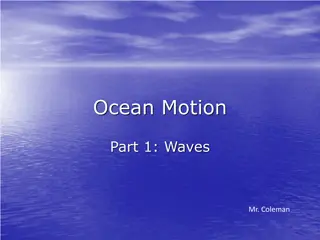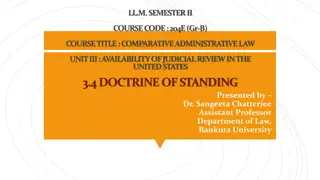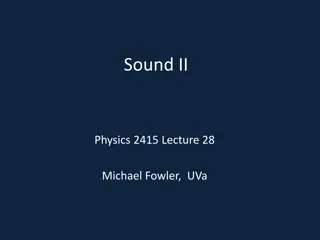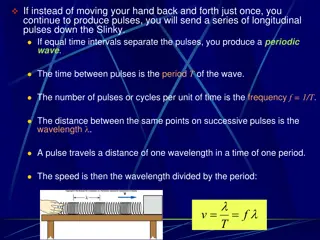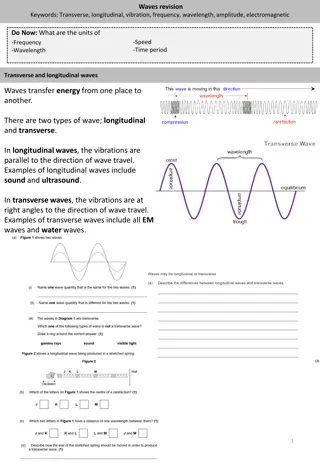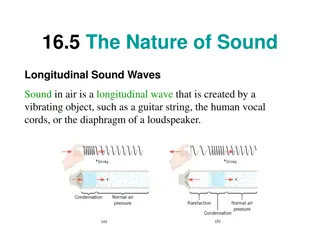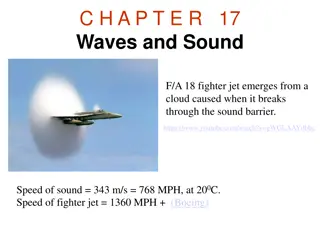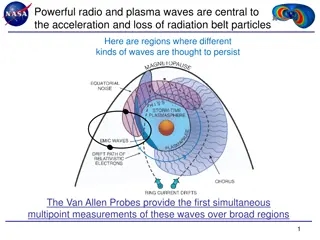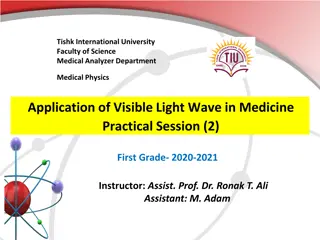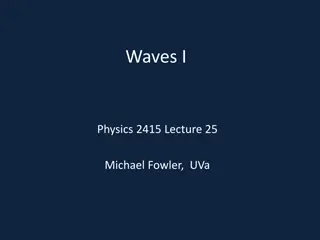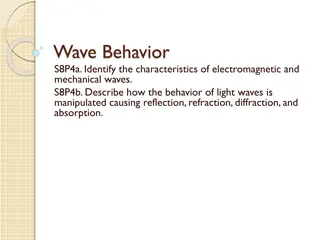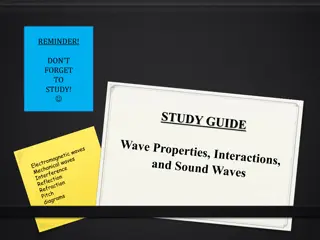Understanding Waves, Light, & Sound: Vocabulary and Concepts
This chapter covers essential vocabulary and concepts related to waves, light, and sound, including amplitude, crest, diffraction, Doppler effect, electromagnetic wave, frequency, interference, longitudinal wave, mechanical wave, medium, photon, pitch, reflection, refraction, sound wave, standing wa
8 views • 21 slides
Understanding Brain Waves: Frequencies and Behaviors
Brain waves are electromagnetic signals produced by the brain, categorized by frequencies into Delta, Theta, Alpha, and Beta waves, each associated with different states of consciousness and behaviors. These waves play a crucial role in our brain's energy utilization and overall functioning.
1 views • 11 slides
Understanding Electromagnetic Waves: Maxwell's Contributions and Hertz's Observations
James Clerk Maxwell's groundbreaking work in the 19th century revealed the fundamental nature of light as an electromagnetic wave. His equations formed the basis for understanding the interplay between electricity and magnetism, predicting the existence of electromagnetic waves. Heinrich Hertz furth
4 views • 24 slides
Understanding Sound Waves and Human Hearing
Sound waves are longitudinal waves where particles move in the same direction. The human body hears sounds through vibrations reaching the cochlea, which produces electrical signals for the brain to interpret. Properties of sound waves include traveling through various mediums at different speeds. F
2 views • 10 slides
Understanding Earth's Interior through Seismic Waves: Part 1
Seismic waves provide crucial evidence about Earth's composition and structure. By analyzing the behavior of primary, secondary, and surface waves, scientists can determine the different layers and materials within the Earth. Primary waves travel through both solid and liquid parts, while secondary
10 views • 10 slides
Understanding Types of Waves and Energy Transport
Explore the different types of waves such as transverse, longitudinal, and surface waves, along with electromagnetic waves. Learn about their properties, how they move through mediums, and their significance in various applications like sound transmission, earthquake detection, and energy transport.
3 views • 10 slides
Exploring Types of Waves and Energy Transport
Discover the various types of waves such as transverse, longitudinal, surface, and electromagnetic waves, along with their characteristics and applications in energy transportation. Learn about the differences between mechanical and electromagnetic waves, how waves transmit energy, and their signifi
3 views • 10 slides
Understanding Wave Motion: Longitudinal and Transverse Waves
Explore the fundamentals of wave motion including longitudinal and transverse waves, wave length, frequency, speed, and the Doppler effect. Learn about different types of waves, their characteristics, and the distinction between wave speed and the speed of a particle. Discover the properties of wave
2 views • 18 slides
Comprehensive Guide to Ultrasonic Testing (UT) in Non-Destructive Testing
Ultrasonic Testing (UT) is a crucial non-destructive testing method utilizing high-frequency acoustic waves for flaw detection, dimensional measurements, material characterization, and more. This guide covers the basic principles, types of sound waves, ultrasonic transducers, test techniques, applic
2 views • 35 slides
Understanding Sound Waves and How They Travel
Explore the fascinating world of sound waves and their behavior as they travel through various mediums. Learn about the generation of longitudinal waves, the importance of a medium for sound propagation, and the factors influencing the speed of sound such as elasticity, density, and temperature. Dis
2 views • 15 slides
Determining Ultrasonic Wave Velocity in Liquid Using Interferometer
An ultrasonic interferometer apparatus is used to determine the velocity of ultrasonic waves in a liquid medium by creating longitudinal stationary waves and utilizing the principles of diffraction. The experiment involves passing monochromatic light through the liquid, creating an acoustic grating,
0 views • 16 slides
Understanding Waves: A Visual Exploration
Explore the fascinating world of waves through visually engaging images and interactive clickers. Learn about different types of waves, including longitudinal and transverse waves, and discover what waves carry - energy, not matter. Delve into the concepts of mechanical and electromagnetic waves, an
1 views • 37 slides
Understanding General Plane Waves in Electromagnetic Theory
This study focuses on the analysis of general plane waves in electromagnetic theory, covering topics such as the general form of plane waves, Helmholtz equation, separation equation, wavenumber vector, Maxwell's equations for plane waves, and the symbolic representation of plane waves. The content d
0 views • 41 slides
Understanding Interference and Beats in Waves
Explore the fascinating phenomena of interference and beats in waves, where overlapping waves interact to create patterns of constructive and destructive interference. Witness how sound waves can also produce beats when interfering in time, resulting in a slow envelope effect. Delve into the princip
0 views • 40 slides
Gravity Waves as a Mechanism of Coupling Oceanic and Atmospheric Acoustic Waveguides to Seismic Sources
Direct excitation of acoustic normal modes in horizontally stratified oceanic waveguides is negligible for shallow earthquakes due to velocity disparities. This study evaluates the contribution of scattering by hydrodynamic waves in generating abyssal T-waves. The research explores the role of scatt
1 views • 6 slides
Exploring the Nature of Waves and Sound
Understanding the nature of waves, both transverse and longitudinal, and their properties such as amplitude, wavelength, and frequency. Delve into the world of water waves, periodic waves, and the speed of waves on a string. Learn about the longitudinal nature of sound waves, the audible frequency r
0 views • 16 slides
Understanding Waves: Properties, Behaviors, and Applications
Waves come in different forms - transverse and longitudinal - each with distinct characteristics and behaviors. Understanding concepts like amplitude, wavelength, frequency, and wave speed is crucial in grasping how waves transfer energy through different materials. The interaction of waves with bou
0 views • 9 slides
Understanding Longitudinal Standing Waves in Musical Instruments and the Human Ear Canal
Musical instruments in the wind family rely on longitudinal standing waves to produce sound, with wind instruments like trumpet, flute, clarinet, and pipe organ being modified tubes of air. This article explores the concept of standing waves in open tubes of air and their relevance to instruments an
0 views • 4 slides
Understanding Waves: Characteristics and Types Explained
Explore the wave nature of sound and electromagnetic radiation, distinguishing between electromagnetic and mechanical waves. Waves are energy-carrying disturbances that do not transport matter. Mechanical waves require a medium for energy transfer, while electromagnetic waves can travel through spac
0 views • 26 slides
Key Issues in Longitudinal Research Design: Insights from the Growing Up in Scotland Study by Paul Bradshaw
Longitudinal research involves observing changes over time in various entities like individuals, households, and institutions. The UK has a rich history of conducting longitudinal studies, including birth cohort studies and family panel studies. Challenges in longitudinal research include stable lea
0 views • 32 slides
Understanding Traveling Waves: Types, Properties, and Equations
Explore the world of traveling waves, including mechanical, electromagnetic, and matter waves. Learn about transverse and longitudinal wave motion, the speed of waves in strings, wave frequency, wavelength, and speed relationships, as well as wave equations for non-repeating waves over space and tim
1 views • 30 slides
Understanding Interference Phenomena and Standing Waves in Musical Instruments
Explore the principle of linear superposition, constructive and destructive interference, beats, and standing waves in transverse and longitudinal instruments. Discover the complexity of sound waves and how spectrum analyzers analyze harmonic frequencies. Calculate the fundamental frequency in a hum
0 views • 7 slides
Understanding Standing Waves in Physics
Standing waves in physics are periodic waves that result from the interference of reflected and inverted waves, creating nodes and antinodes along a medium. These standing wave patterns can be observed in vibrating strings, such as guitar strings, where specific frequencies produce distinct harmonic
0 views • 29 slides
Surface Waves and Free Oscillations in Seismology
Exploring surface waves, potentials, and free oscillations in seismology with a focus on Rayleigh waves, Love waves, and wave equations. Understand the dispersion relation, geometry, and solutions for waves propagating in elastic half spaces and media with depth-dependent properties.
0 views • 55 slides
Understanding Fundamentals of Acoustics: Waves, Frequencies, and the Doppler Effect
Sound involves vibrations of air molecules, with sound waves being longitudinal and water waves transverse. The transduction of sound into mechanical energy in the ear allows us to hear and perceive frequency/pitch. Exploring the Doppler Effect enhances our understanding of how motion affects sound
0 views • 10 slides
The LABB System: Advancing Swiss Educational Research with Longitudinal Data
The LABB System, led by Dr. Jacques Babel at FSO, focuses on longitudinal analyses in Swiss education. Leveraging AHV numbers for data integration, the project aims to enhance understanding of the Swiss educational system through trajectory analyses. The team includes dedicated members like Francesc
0 views • 13 slides
Understanding Ocean Waves and Their Dynamics
Exploring the science behind ocean waves, this resource delves into why waves occur, the components of a wave, how water moves within a wave, and the effects of waves hitting a beach. From defining waves to discussing wave characteristics, this content provides valuable insights into the fascinating
0 views • 13 slides
Understanding the Doctrine of Standing in US Judicial Review
The doctrine of standing in United States judicial review is explained, focusing on the capacity of a plaintiff to seek judicial review based on injury-in-fact, causation, and redressability. The requirements of the standing doctrine and its relation to Article III of the US Constitution are discuss
0 views • 12 slides
Understanding Sound Waves: Harmonic Vibrations and Longitudinal Waves
Exploring the concepts of harmonic string vibrations in musical instruments, longitudinal waves in pipes, boundary conditions at pipe open ends, and the wave equation for waves in two and three dimensions. Topics include interference, Doppler effect, and wavelength calculations for standing harmonic
0 views • 19 slides
Understanding Wave Properties and Standing Waves in Physics
Exploring the concepts of periodic waves, superposition, and standing waves in physics using examples such as a Slinky, two waves traveling in opposite directions, and a guitar string. Learn about wave speed, frequency, wavelength, nodes, antinodes, and the impact of tension on wave propagation. Dis
1 views • 17 slides
Understanding Waves: Types, Equations, Reflection, and Electromagnetic Spectrum
Waves are vital in transferring energy, and they come in two main types: longitudinal and transverse. Learn about wave properties, equations relating to frequency, time period, and wave speed, as well as reflections, refractions, and the electromagnetic spectrum. Discover how different types of wave
0 views • 4 slides
Understanding Sound Waves: Nature, Properties, and Characteristics
Sound waves are longitudinal waves created by vibrating objects in air. They cannot propagate in a vacuum. Understanding how we hear involves exploring wave representations and the frequency ranges of sound waves, from infrasonic to ultrasonic. Sound also exhibits objective and subjective properties
0 views • 12 slides
Understanding Waves and Sound: A Visual Exploration
Explore the nature of waves and sound through a visual journey covering topics like transverse waves, longitudinal waves, water waves, periodic waves, wave speed, the speed of a wave on a string, the nature of sound, and the frequency of sound waves. Discover how waves carry energy, the different ty
1 views • 32 slides
Understanding Standing Waves in Three Dimensions
Exploring the concepts of normal modes, wave equations, and standing waves in three-dimensional spaces, including the derivation of wave functions within rectangular enclosures and the calculation of normal mode frequencies. The content discusses boundary conditions, particular wave functions, and d
0 views • 19 slides
Evaluation of Experimental Study on Standing Waves Formation
The evaluation report discusses the strengths and weaknesses of a presentation on standing waves, covering aspects like theoretical understanding, experimental demonstration, and presentation quality. Both the reporter and opponent are critiqued for their approaches, with the opponent highlighting t
0 views • 5 slides
Unveiling the Role of Radio and Plasma Waves in Particle Acceleration
Radio and plasma waves play a crucial role in the acceleration and loss of radiation belt particles. The Van Allen Probes provide groundbreaking multipoint measurements of these waves in various regions, shedding light on phenomena such as chorus waves and resonant wave acceleration. Strong correlat
0 views • 8 slides
Understanding Visible Light Waves in Medicine and Physics
Visible light waves play a crucial role in medicine and physics, where they are the only electromagnetic waves that humans can see. These waves create the colors of the rainbow with varying wavelengths, allowing us to perceive different colors and forms of light. Understanding the properties of visi
0 views • 22 slides
Understanding Waves in Physics: Dimensions, Types, and Analysis
Explore the dimensions of waves in physics, including transverse and longitudinal types, wave velocity calculations, harmonic waves, dimensional analysis examples, and simulations on strings. Learn how dimensional analysis helps in understanding wave properties and relationships in various scenarios
0 views • 13 slides
Understanding Light Wave Behavior: Reflection and Refraction
Explore the characteristics of electromagnetic and mechanical waves along with how light waves can be manipulated through reflection and refraction. Discover how reflection occurs when waves bounce off surfaces and how refraction bends waves as they move between different mediums, affecting their sp
0 views • 18 slides
Understanding Waves: Definitions and Characteristics
This educational content covers definitions and characteristics of waves, including transverse and longitudinal waves, how waves travel through a medium, interference, earthquake waves, sound properties like amplitude and pitch, the Doppler Effect, and differences between reflection and refraction.
0 views • 10 slides


